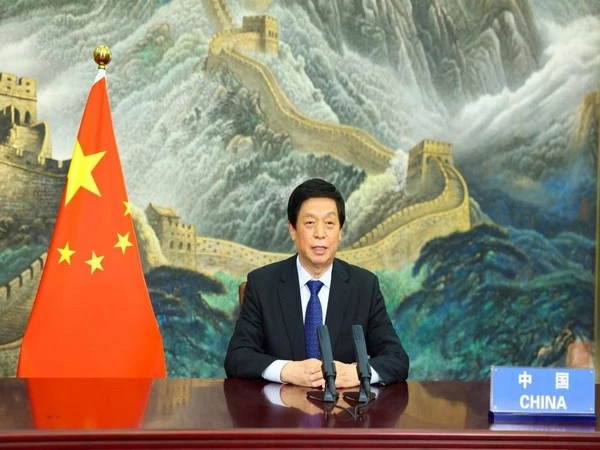

Li Zhanshu, one of the top seven leaders of China is visiting Kathmandu on Monday
Beijing is sending its top legislator Li Zhanshu to Kathmandu on Monday, raising speculations about the purpose of the visit.
According to the official announcement made by Nepal and China, Li, the chairman of China’s National People’s Congress Standing Committee, is visiting Nepal from September 12 to 14 at the invitation of Agni Prasad Sapkota, speaker of the House of Representatives, the lower house of Nepali parliament.
He is also part of the big-seven, headed by the General Secretary of the Communist Party of China (CPC), who comprise the standing committee of the 25-member Politburo.
The visit comes at a time when the South Asian nation is gearing up for holding crucial federal and provincial elections on November 20 in a single phase.
In the run-up to the elections, the ruling coalition led by the Nepali Congress is presently working out to finalize the seat-sharing arrangements while the main opposition Communist Party of Nepal (Unified Marxist Leninist) is also coming up with its counter strategies for the same.
Li, the third-ranked leader in China’s political hierarchy, has been scheduled to hold delegation-level talks with Agni Prasad Sapkota, his Nepali counterpart, and call on President Bidya Devi Bhandari and Prime Minister Sher Bahadur Deuba, during the whirlwind visit.
According to the itinerary released by Nepal’s foreign ministry, the Nepali parliament speaker will host a banquet in honor of the visiting Chinese top dignitary and his delegation on Monday.
Apart from that, Li is also scheduled to meet the key leaders of the two major communist parties—Pushpa Kamal Dahal alias Prachanda and KP Sharma Oli, who are also the former prime ministers of the country.
Prachanda is the chairman of the CPN (Maoist Center), a key coalition partner in the Deuba-led government while Oli is the chairman of the CPN (Unified Marxist Leninist), the main opposition.
What led Beijing to send its powerful leader to Nepal at this critical juncture remains unclear. But insiders see some domestic and geopolitical reasons behind th powerful leader’s visit to Nepal at this point of time.
Beijing feels comfortable with a stable communist regime in Kathmandu. However, its hopes have been dashed following the vertical split of the then Nepal Communist Party (NCP) in March 2021 due to a bitter factional feud.
A leader of the ruling Nepali Congress said that the visit of Chinese leader could be to see the possibility of the merger between the communist parties in the post-election scenario and encourage them to form a new government in collaboration.
“As of now, the Nepali Congress is confident that the two communist parties in the coalition government will not break the alliance at least until elections as they promised earlier. In the post-election context, Beijing might try to see a friendly government involving the key communist forces,” the leader told India Narrative requesting anonymity.
Yubanath Lamshal, a former Nepali ambassador and foreign affairs analyst, also agrees on the above mentioned Nepali Congress leader’s argument and suggests that China has some reasons why it favors a friendly government in Kathmandu amid changing geopolitical shifts due to growing US-China rivalry.
“China may have its desire to see one strong communist party in Nepal so that Beijing could count on it to check any untoward incidents inimical to its security interests from the southern border with Nepal,” Lamshal told India Narrative in a brief interview on Saturday.
Lamshal also pointed to Chinese foreign minister Wang Yi’s remarks last March when he visited Kathmandu. In his meetings with Nepal’s key leaders, Wang had said, “Beijing would oppose any attempt to undermine Nepal’s sovereignty and independence, interfere in its internal affairs and engage in “geopolitical games”, indirectly hinting at growing US presence in the country.
Lamshal, who is also former editor of state-run The Rising Nepal, said that it is natural for Chinese authorities to wish for a Beijing friendly government in Kathmandu and give a try for that with the heightened US-China geopolitical rivalry.
China has, of late, increased its engagements with the entire political spectrum of Nepal. Li will be the third Chinese leader to visit Nepal this year. In the second week of June, Head of the Chinese Communist Party (CCP) international department, Liu Jiancho, visited Nepal and gave a message that China wants to enhance ties with all the political parties including the chief ruling party Nepali Congress, which has maintained a close ties with the United States in the recent years.
Prior to that, in the last week of March, China’s foreign minister and state councilor Wang Yi came to Nepal. He urged Nepal to accelerate connectivity projects under the China’s Belt and Road Initiative (BRI) even as Nepal reluctantly conveyed that it wants only grants not commercial loans.
Officials believe that Chinese leader Li is likely to seek Nepal’s commitment towards the BRI when he arrives here.
Li’s stopover in Nepal is part of his four-nation tour that includes Russia, Mongolia, Nepal and South Korea. He will fly to Kathmandu from Mongolia on Monday and leave for South Korea on September 15.
Also Read: Senior Chinese official arrives in Nepal to unify Communist factions ahead of elections
Union Minister of Coal and Mines G Kishan Reddy on Tuesday held an inter-ministerial meeting…
India's largest automobile in-plant railway siding at Maruti Suzuki's Manesar facility started operation on Tuesday,…
Google on Tuesday unveiled its Safety Charter for India's AI-led transformation, at the "Safer with…
The human rights organisation of the Baloch National Movement (BNM), Paank, has published its most…
The Israel Defence Forces (IDF) on Tuesday claimed that it has killed Iran's senior-most military…
Amid escalating conflict between Iran and Israel, the Ministry of External Affairs (MEA) on Tuesday…